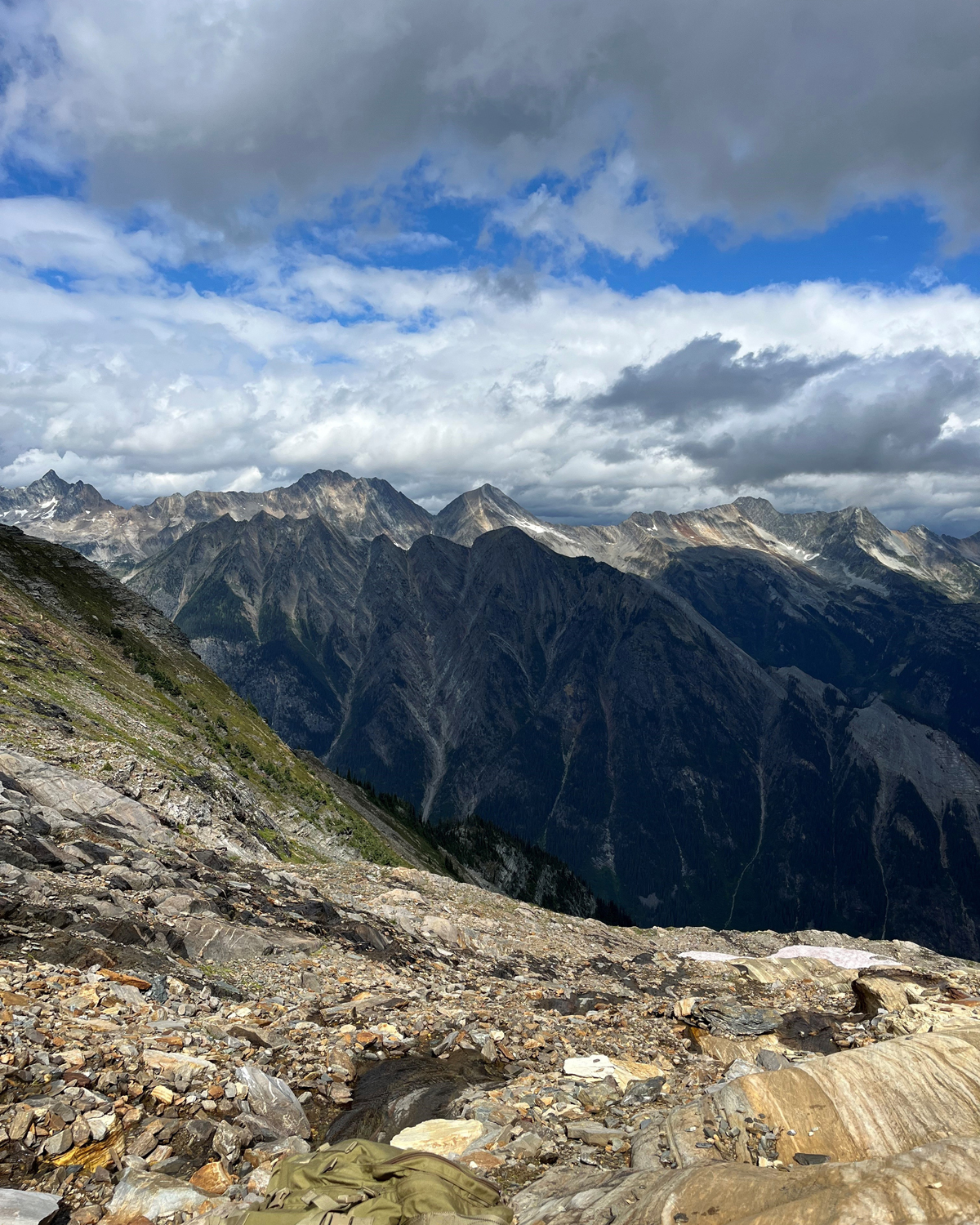
Petty Officer 2nd Class Paul Paquette inspecting the UXO site on Ross Peak after the successful detonation of the UXO. Photo: Petty Officer 1st Class Burrell
A/ SLt Patrick Delisle, MARPAC PA
—
As the helicopter climbs above 2,000 metres, two Explosive Ordnance Disposal (EOD) Operators gaze out across the rugged peaks of the Rocky Mountains, the serene beauty in stark contrast with their dangerous mission ahead. For safety, one EOD Tech holds the C4 plastic explosives in his pack, while the other carries the detonators. Soon they will land and begin the precarious task of locating and disposing of the ordnance, ensuring the safety of this majestic environment for future generations.
Flying in a helicopter loaded with explosives over a high mountain pass might sound like a scene out of a James Bond movie, but for the Fleet Diving Unit (Pacific)’s (FDU[P]) Maritime Explosive Ordnance Disposal (MEOD) cell, it’s just another Tuesday.
But why are highly specialized Navy Divers tasked with blowing up projectiles on the side of a mountain? The answer lies in FDU(P)’s unique responsibilities. This elite team is tasked with disposing military ordnance. Their expertise ensures that even the most challenging and austere locations – whether the bottom of the sea, or the jagged ridges of Glacier National Park – are made safe from the dangers of leftover military explosives.

Image from near the UXO location on Cross Peak. Photo: Petty Officer 1st Class Burrell
This most recent tasking had them travelling to Revelstoke, B.C. to dispose of two pieces of unexploded ordnance (UXO) from a prior Operation (Op) Palaci found in remote locations at Crossover and Ross Peak, far off the path for all but the most intrepid hiker. Op Palaci is a joint operation with the Canadian Armed Forces (CAF) and Parks Canada Agency (PCA) in Rogers Pass, B.C., with the goal to reduce the risk of naturally occurring avalanches. This is done using precise artillery strikes to create controlled avalanches, before the snowpack reaches a point where the avalanche could become far more destructive.
After months of planning, tracking weather patterns, and a day of travel to Revelstoke, Petty Officer 1st Class (PO1) Burrell and Petty Officer 2nd Class (PO2) Paquette were on scene. PO1 Burrell, head of the MEOD department, said that “On average, we get about 100 calls a year for ordnance disposal across B.C.”
Preparation for the mission was meticulous, with the operators selectively choosing their loadout to ensure only the essentials were included. The need for minimal equipment was driven by the importance of weight, with the helicopter having to ascend to such high altitudes. Alongside their explosives and specialized tools, they also packed essential survival gear for the mountains. This included emergency supplies, first aid kits, and bear spray, given the possibility of encountering grizzlies on the trail.
The morning of the mission saw a safety brief on the UXOs, and an overview of the plan to safely explode them, including potential escape routes in case of an emergency.
After being dropped off at a designated landing zone, the team trekked to Crossover Peak and located the first UXO, a 105mm Howitzer Artillery Round. While each EOD task is different, the basic approach remains the same. Once the location is deemed safe for disposal, the team rigs their own explosive charge, moves to a safe location, then triggers the detonation. The second UXO, a 106mm Recoilless Rifle Round, proved just as straightforward. A quick hike back down to a rendezvous point with the helicopter for extraction, and the mission was complete.
When questioned how it feels to deal with explosives on a regular basis, PO1 Burrell jokes, “It’s fun, but you get used to it after a while. Cool guys don’t look at explosions.” He ends, stating, “I get a lot of satisfaction out of the job. We’re making the world a safer place, one bang at a time!”

Petty Officer 2nd Class Paul Paquette in the process of reorganizing his gear after the end of their mission at the Parks Canada compound in Rogers Pass B.C.








